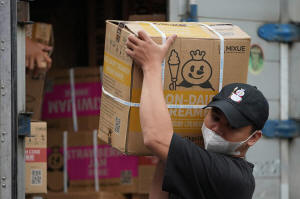Make room Starbucks and McDonald's. China's Mixue and other brands win
fans in Southeast Asia
[March 15, 2025] By
KANIS LEUNG, VINCENT THIAN and TIAN MACLEOD JI
HONG KONG (AP) — Chinese food and beverage brands are gaining ground
across Southeast Asia, offering alternatives to big name American chains
and expanding Beijing’s commercial and cultural influence in neighboring
economies.
The Chinese beverage giant Mixue Group has become the world’s largest
F&B chain by number of outlets, overtaking Starbucks and McDonald’s.
The company, whose brand name Mixue Bingcheng means “Honey Snow Ice
City,” in Chinese, is capitalizing on the region-wide sweet tooth with
affordable offerings of ice cream, coffee and bubble tea drinks.
“Even on social media like TikTok and others, there is a joke that any
empty shophouse would soon turn into a Mixue store,” Rahma Yuliana said,
referring to a popular saying in Indonesia, where Mixue has more than
2,600 outlets.
The single mother, who runs an online business, takes her daughter for
afterschool treats that won't drain her wallet, such as a cup of brown
sugar milk tea that costs $1.10, about one-third cheaper than similar
offerings by rival Taiwanese tea chain Chatime. An ice cream sells for
as little as 50 cents, undercutting McDonald’s.
As of September, Mixue Group had over 45,000 stores carrying its Mixue
tea drinks, ice creams and Lucky Cup coffee products, more than the
store numbers of Starbucks and McDonald’s, industry analysts reported.
About 40,000 of those are in China.

More broadly, by December, Chinese F&B brands had opened over 6,100
outlets in Southeast Asia, Singapore-headquartered research firm
Momentum Works reported. India and Vietnam account for roughly
two-thirds, while there are relatively more Chinese brands in Singapore
and Malaysia, which have sizable Chinese-speaking populations.
Nearly all of Mixue's stores are franchises that the company supplies
with ingredients for drinks like Creamy Mango Boba, Mango Oats Jasmine
Tea and Coconut Jelly Milk Tea.
Apart from Mixue, other market stars include hotpot giant Haidilao, Fish
With You sauerkraut fish restaurants, and well-known beverage brands
such as Luckin Coffee, Heytea and Chagee.
Mixue's shares have doubled from their IPO price since their March 3
trading debut in Hong Kong.
Momentum Works CEO Jianggan Li said Chinese businesses are actively
seeking new growth in Southeast Asia after facing fierce competition in
their home market.
The push by food and drink retailers has raised awareness that China has
more to offer than just cheap electronics.

[to top of second column] |

A worker carries a box of supplies for a Mixue store in Jakarta,
Indonesia, Wednesday, Feb. 19, 2025. (AP Photo/Achmad Ibrahim)
 The companies are well-equipped,
using automation to enhance their efficiency, and adept at online
marketing, Li said. Big Western brands sometimes take a long time to
find local partners and develop long-term plans. The Chinese F&B
companies are “much more impatient," he said.
In Thailand’s capital Bangkok, Chinese entrepreneur Siya Han has
invested over $1.37 million in 12 Mixue stores and about 10 other
outlets selling spicy broth bowls, sauerkraut fish and fried chicken
steaks in about six years. Outlets in shopping malls take time to
recover costs due to huge rent deposits, she said, but her other
outlets typically break even within six months to a year, excluding
their lease guarantees.
“If you open Chinese restaurants slowly, you can't survive,” she
said.
In the Malaysian capital of Kuala Lumpur, Chinese sauerkraut fish
chain Fish With You vice president Liu Liujun also spotted
opportunity in Southeast Asia’s large ethnic Chinese population and
growing economies.
The brand’s $235,000 investment in one of its Malaysian outlets paid
off in just nine months, with lines out the door almost daily, said
Liu, who oversees the company's overseas expansion across the
region.
A customer, Victoria Kovalan said the new Chinese brands made it
easier for her to try new cuisines. “It’s opened up our palates,”
she said, referring to the popularity of Sichuan hotpots, known for
their spicy flavors.
Vietnamese student Nguyen Thu Hoŕi in Hanoi initially was skeptical
about Mixue as a Chinese brand but has become a regular customer,
she said, won over by its affordability and better-than-expected
quality.
The expansion of Chinese food and beverage brands is part of a
broader trend where Chinese goods are no longer seen as merely cheap
but as having real value, said Gordon Mathews, a professor of
anthropology at the Chinese University of Hong Kong.
Recalling the cultural influence from McDonald’s global expansion,
Mathews said he visited its first outlet in southern China’s
economic hub of Guangzhou in the 1990s, where a clerk told him, “I
want to go to America.”
If Chinese food brands exploded worldwide, they might have that
influence, though the impact remains to be seen, he said.
“China does have an uphill struggle to obtain soft power, but it’s
doing an excellent job with its products,” he said.
All contents © copyright 2025 Associated Press. All rights reserved |